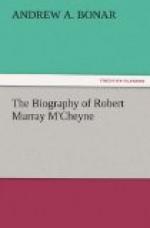The memorable Convocation met at Edinburgh on November 17th. There were five hundred ministers present from all parts of Scotland. The encroachment of the civil courts upon the prerogatives of Christ, the only Head acknowledged by our church, and the negligent treatment hitherto given by the legislature of the country to every remonstrance on the part of the church, had brought on a crisis. The Church of Scotland had maintained, from the days of the Reformation, that her connection with the State was understood to imply no surrender whatsoever of complete independence in regulating all spiritual matters; and to have allowed any civil authority to control her in doctrine, discipline, or any spiritual act, would have been a daring and flagrant act of treachery to her Lord and King. The deliberations of the Convocation continued during eight days, and the momentous results are well known in this land.
Mr. M’Cheyne was never absent from any of the diets of this solemn assembly. He felt the deepest interest in every matter that came before them, got great light as to the path of duty in the course of the consultations, and put his name to all the resolutions, heartily sympathizing in the decided determination that, as a church of Christ, we must abandon our connection with the State, if our “Claim of Rights” were rejected. These eight days were times of remarkable union and prayerfulness. The proceedings, from time to time, were suspended till the brethren had again asked counsel of the Lord by prayer; and none present will forget the affecting solemnity with which, on one occasion, Mr. M’Cheyne poured out our wants before the Lord.
He had a decided abhorrence of Erastianism. When the question was put to him, “Is it our duty to refuse ordination to any one who holds the views of Erastianism?” he replied,—“Certainly, whatever be his other qualifications.” He was ever a thorough Presbyterian, and used to maintain the necessity of abolishing lay patronage, because,—1st, It was not to be found in the word of God; 2nd, It destroyed the duty of “trying the spirits;” 3rd, It meddled with the headship of Christ, coming in between Him and his people, saying, “I will place the stars.” But still more decided was he in regard to the spiritual independence of the church. This he reckoned a vital question: and in prospect of the disruption of the Church of Scotland, if it were denied, he stated at a public meeting,—1st, That it was to be deplored in some respects, viz., because of the sufferings of God’s faithful servants, the degradation of those who remained behind, the alienation of the aristocracy, the perdition of the ungodly, and the sin of the nation. But, 2nd, It was to be hailed for other reasons, viz., Christ’s kingly offices would be better known, the truth would be spread into desolate parishes, and faithful ministers would be refined. And when, on March 7th of the following year, the cause of the church was finally to be pleaded at the bar of the House of Commons, I find him writing: “Eventful night this in the British Parliament! Once more King Jesus stands at an earthly tribunal, and they know Him not!”




